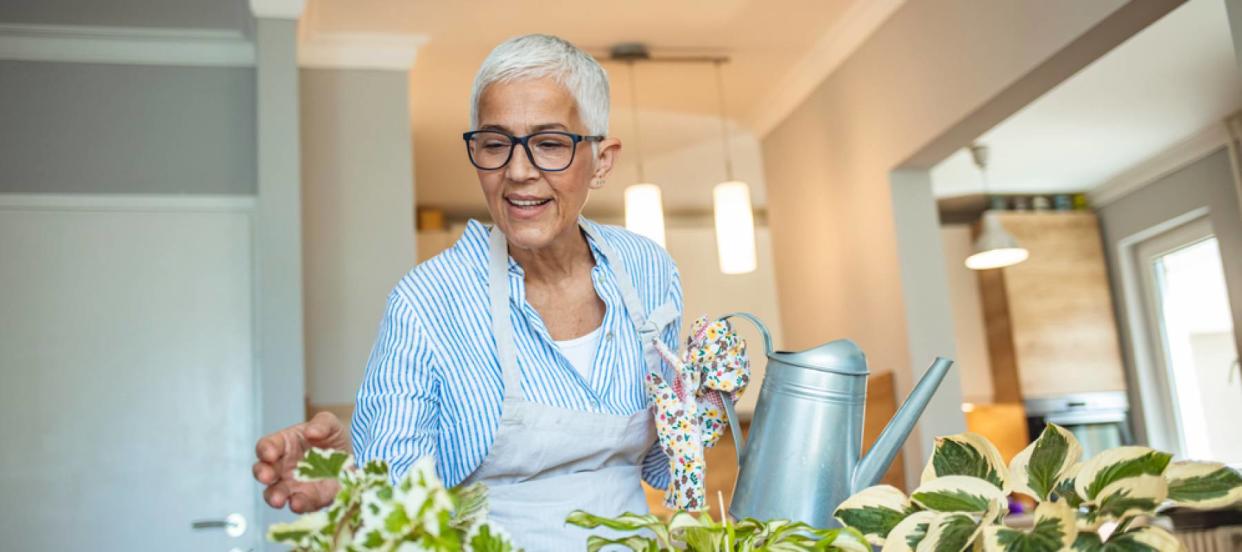‘We’re seeing the writing on the wall’: Baby boomers are ‘stuck in place’ and can’t afford to move out of their homes — what needs to change?

Susan Apel and Keith Irwin purchased a four-bedroom house in Lebanon, New Hampshire, 24 years ago — and are now looking to downsize in their golden years.
Apel finds it harder to climb up the stairs, while Irwin is tired of shoveling the snow and doing yard work.
“We’re seeing the writing on the wall,” Apel, a 71-year-old retired law professor, told the New York Times.
Don't miss
These 5 magic money moves will boost you up America's net worth ladder in 2024 — and you can complete each step within minutes. Here's how
Thanks to Jeff Bezos, you can now use $100 to cash in on prime real estate — without the headache of being a landlord. Here's how
'It's not taxed at all': Warren Buffett shares the 'best investment' you can make when battling rising costs — take advantage today
The couple estimated their current house is worth around $700,000 and had hoped the sale would help them snag a smaller place — they’re looking for a two-bedroom condo with a den — but they simply can’t find one within their budget.
“We were very grateful to live in this lovely place and to have paid off our house,” Apel said. “It never occurred to us that it didn’t give us the ability to move out of it.”
Older Americans can’t afford to leave their homes
A Redfin survey of older American homeowners (aged 60 and over) revealed that more than three-quarters of this group will consider staying in their current home as they age — or are already aging in place.
About 27% of these respondents who aren’t planning to sell their home anytime soon said it’s because their home is completely or almost paid off, while 21% say they’re staying put because home prices are now too high.
“Are [older Americans] aging in place, or stuck in place?” questioned Linna Zhu, a research economist at the Urban Institute, according to the Times. “Do we need to rethink this so-called American Dream? It worked for previous generations, but does it still work today?”
Smaller homes don’t necessarily cost less if they’re new construction or are situated in communities with extra amenities.
Apel told the Times one unit she and her husband recently saw cost $950,000 and needed some work, while even “tiny shoeboxes” were selling for $600,000.
Some older homeowners who haven’t fully paid off their mortgage yet are confined by their “golden handcuffs” — they are locked into lower mortgage rates and buying a new home today means switching to a much higher rate.
But this is a major problem for both millennial Americans with families who need the extra space and the empty nester boomers who are better suited to smaller pads.
"You've got a pure housing mismatch for older homeowners. They are mismatched physically or functionally with the house that they're in," Gary Engelhardt, an economist at Syracuse University who studies aging and housing markets, told NPR. "That's because it's multi floor living. It's stairs. It's also other upkeep."
Engelhardt added this can lead to health hazards for seniors as well, such as falls.
Read more: Barbara Corcoran predicted mortgage rates will hit a 'a magic number' and send housing prices 'through the roof' — here's how to set yourself up today
What needs to change?
Some experts suggest policy changes could help older Americans move out of their large homes, while putting more supply back into the market for younger buyers.
Engelhardt told NPR the government could encourage the construction of housing that’s better suited to needs of older Americans, like creating a tax credit to encourage developers to build accessible housing, similar to the Low Income Housing Tax Credit.
But another important facet of the issue is aging in place — many baby boomers, like Apel and Irwin, don’t want to leave the communities they’ve been residing in for decades.
"People want to be able to age in their communities, but there are very few options available for people who do want to do that, but want to downsize," said Danielle Arigoni, managing director for Policy and Solutions at National Housing Trust.
Some neighborhoods have zoning restrictions that only allow for single-family homes, but cities and states could change these rules to allow a mix of different types of housing in all neighborhoods.
Certain low-density neighborhoods could also be allowed to split large lots and create more housing.
Arigoni said building accessory dwelling units, like backyard cottages and basement apartments, is another option. Older homeowners can move into the smaller units and rent out their main property to families, providing them with an additional stream of income as well.
What to read next
Car insurance rates have spiked in the US to a stunning $2,150/year — but you can be smarter than that. Here's how you can save yourself as much as $820 annually in minutes (it's 100% free)
Jeff Bezos told his siblings to invest $10K in his startup called Amazon, and now their stake is worth over $1B — 3 ways to get rich without having to gamble on risky public stocks
Suze Orman says Americans are poorer than they think — but having a dream retirement is so much easier when you know these 3 simple money moves
This article provides information only and should not be construed as advice. It is provided without warranty of any kind.
